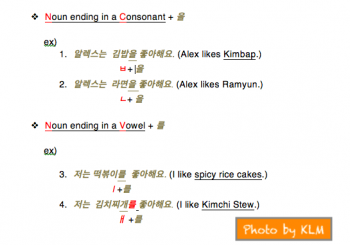Object Marking Particles In Korean Posted by Kyung-Hwa on Feb 21, 2018 in Grammar, Korean Language
People who study Korean frequently ask me about these small words, 이/가, 은/는, or 을/를 in the Korean language. Although these markers have little or no meaning by themselves, they distinguish a subject, topic, or object in a Korean sentence. In this post, we will explore the object markers, 을 and 를 in the Korean language.
If you need to review subject markers and topics markers in the Korean language, please follow the link below to review them.
- For 이 and 가 “What Is a Subject Marking Particle?”
- For 은 and 는 “ What Is a Topic Marking Particle?”
These object markers ‘-eul(을)’ and ‘-reul(를)’ are attached to nouns and indicate the object in the sentence. You add 을 to a noun when the noun ends in a consonant, and 를 to a noun when the noun ends in a vowel.
*One tip for you to remember about an object in the Korean sentence, unlike English, a Korean object is placed after a subject/topic and before a verb.
ex) 저는 한국어를 공부해요. ( I study Korean.)
Korean: Subject + Object + Verb ( English: Subject + Verb + Object.)
As I mentioned in the previous posts, native Koreans will understand you without these markers, however using these subject, topic, and object markers will help you to deliver your message in a clearer way.
If you need a little extra practice, please try to fill in the following blanks. Just don’t forget to follow these rules.
(Noun ending in a Consonant) + 을
(Noun ending in a Vowel) + 를
- 저는 한국어____ 공부해요. (I study Korean.)
- 저는 엑소 _____ 좋아해요. (I like EXO.)
- 선생님은 음악 ____ 사랑해요. ((MY) Teacher loves music.)
- 친구가 한국 드라마____ 좋아해요. ((MY) friend likes Korean dramas.)
Are you ready to check your answers?
- 저는 한국어를 공부해요. (I study Korean.)
- 저는 엑소를 좋아해요. (I like EXO.)
- 선생님은 음악을 사랑해요. ((MY) Teacher loves music.)
- 친구가 한국 드라마를 좋아해요. ((MY) friend likes Korean dramas.)
감사합니다! (Thank you!)

Build vocabulary, practice pronunciation, and more with Transparent Language Online. Available anytime, anywhere, on any device.




